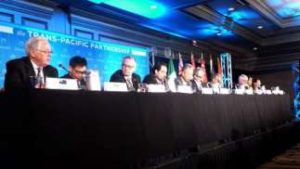The thing Sanders, Trump, and Clinton agree on; it’s that bad – David Korten
The Trans-Pacific Partnership is slated for an up-or-down vote in Congress. Proponents say it’s about free trade. But it looks more like corporate colonization.

One issue unites three U.S. presidential candidates from quite different positions on the political spectrum. Donald Trump, Hilary Clinton, and Bernie Sanders all oppose the Trans Pacific Partnership (TPP).
The TPP is a trade and investment agreement between the U.S. and 11 other Pacific Rim nations now awaiting an up-or-down vote by U.S. Congress. Trump says it’s a bad deal for the U.S. Clinton says it will cost jobs and lower labor, food safety, and environmental standards. Sanders says it is a corporate assault on democracy.
Trump is right: It’s a bad deal. But he’s wrong that it’s bad only for the United States. It’s actually bad for all of the 12 countries. Clinton is right that it will cost jobs and lower standards, but she’s wrong that the problem is failing to set the bar high enough.
Only Sanders names the most essential reason we must reject the TPP: It is an all-out corporate assault on democracy. Its approval would empower corporations to further hamstring efforts by any member nation to address the potentially terminal environmental, social, and economic threats of our time.
International agreements like the TPP are a corporate lobbyist’s dream. Here is the playbook for creating them.
- Get the world’s most powerful corporations together to make a wish list of rule changes.
- Bundle them into an international agreement of thousands of pages of technical legal text that few people are likely to read.
- Call it a free-trade agreement and promise that it will create jobs, grow economies, and bring the world together.
- Include a provision that foreign corporations can sue a signatory government for any loss of anticipated profits due to government action.
- Require that these claims be decided by secret international tribunals which are composed of three private-sector attorneys; preclude review of the awards they grant.
- Push the agreement through the national legislative bodies of the prospective member nations under rules that limit debate, prohibit amendments, and require a simple up-or-down majority vote.
This playbook got us NAFTA (the North American Free Trade Agreement) and similar agreements. The protection of corporate profits against government regulation is in NAFTA. So when U.S. President Obama rejected the Keystone XL Pipeline, the TransCanada Corporation immediately sued the U.S. for $15 billion in lost anticipated profits. If approved, the TPP will expand that provision to all 12 signatories.
The use of the corporation as a legal instrument to circumvent democracy has a long history. The precursors of the TPP trace to the aftermath of World War II when most colonized countries and territories gained their independence. Foreign assistance funded by foreign exchange loans soon got those countries into debts they could not repay.
This is our opportunity to take a stand for democracy.
The International Monetary Fund and the World Bank stepped in as global loan sharks. They refinanced the national debts in return for acceptance of “structural adjustment,” a kind of bankruptcy procedure that forced each indebted country to roll back its social programs and open its national economy to foreign corporate ownership and market penetration. I witnessed the resulting devastation of the poor and middle class during my 15 years living and working in Asia on the staff of the Ford Foundation and USAID. Colonial rule had returned in a new guise.
Corporate lobbyists, backed by free market economists, soon realized that they could advance the same process in all countries, including the United States, through international trade and investment agreements. That led to NAFTA as the flagship for future regional agreements and the World Trade Organization (WTO) as the flag- ship for global agreements.
The proposed TPP and its counterpart Transatlantic Trade and Investment Partnership (TTIP) are the most recent such agreements.
The U.S. presidential race is shining a spotlight on the TPP and building broad public awareness that its stated purpose and benefits are bogus. This is our opportunity to take a stand for democracy: Defeat the TPP, begin to roll back corporate rights, and get on with securing the right of all people to democratic self-rule.
Source: Yes! Magazine, 23 Mar 2016 http://www.yesmagazine.org/new-economy/the-thing-sanders-trump-and-clinton-agree-on-its-that-bad-20160323
David Korten is co-founder and board chair of YES! Magazine, president of the Living Economies Forum, co-chair of the New Economy Working Group, and the author of several influential books, including When Corporations Rule the World, and Change the Story, Change the Future: A Living Economy for a Living Earth.






























